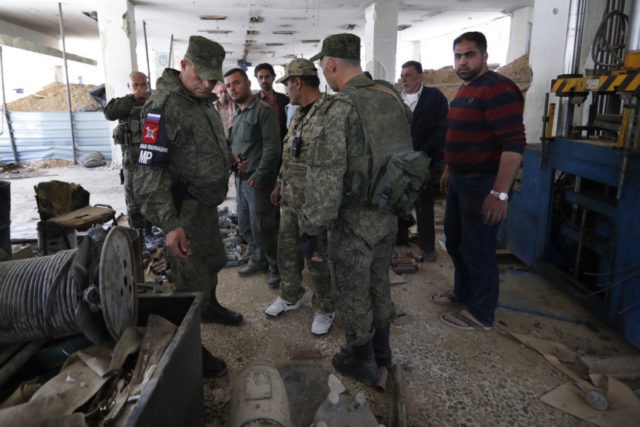After several days of stalling, Russia and Syria finally allowed inspectors from the Organization for the Prohibition of Chemical Weapons (OPCW) to visit the site of the alleged chemical weapons strike in Douma on Tuesday, according to Syrian state media.
The visit will have occurred ten days after the attack.
On Tuesday morning, France joined the United States and the United Kingdom in expressing concerns that evidence has been removed from the site while inspectors were held at bay.
“The Syrian regime has reportedly been attempting to conceal the evidence by searching evacuees from Douma to ensure samples are not being smuggled from this area, and a wider operation to conceal the facts of the attack is underway, supported by the Russians,” British Prime Minister Theresa May said in a speech to Parliament on Monday, repeating an accusation leveled by the U.K. delegation to OPCW.
The Russians modified their story after May’s remarks and claimed it was the United Nations that considered the Douma area unsafe for investigators and refused to authorize their visit. Moscow previously claimed that U.S., British, and French strikes on Syrian targets Friday night had destabilized the region and made it unsafe for foreign visitors to travel.
U.N. representatives promptly disputed Russia’s claim, saying there are no security concerns preventing a visit and the inspectors should be given access to Douma as quickly as possible.
“As of today, Russia and Syria still refuse to give inspectors access to the site of the attack. It is very likely that proof and essential elements are disappearing from this site,” the French Foreign Ministry said in a statement on Tuesday.
“It is essential that Syria finally gives full, immediate and unfettered access to all of the OPCW’s demands, whether to visit sites, interview people or consult document,” the statement declared.
Russia and Syria initially said they would permit inspectors to visit Douma on Wednesday but, evidently, they relented to international pressure, as Syrian state television reported OPCW inspectors entered the town on Tuesday.
CBS News quotes correspondents and analysts who believe the Douma site has been sanitized and tainted enough to make conclusive forensic analysis extremely difficult, if not impossible.
Hamish de Bretton-Gordon, formerly head of the chemical weapons unit of the British army, noted that both of the chemical agents detected by U.S. analysis of blood and urine samples from victims, chlorine and sarin, dissipate quickly in the open air. The investigators will therefore need to examine medical samples from victims.
De Bretton-Gordon also said that his contacts in Douma have ominously informed him that “doctors from the suburb had been taken in recent days into central Damascus for briefings, and not returned.”

COMMENTS
Please let us know if you're having issues with commenting.